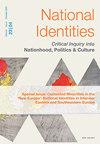Perceptions, experiences and accommodations of Britishness; an exploration of national identity amongst young British Sikhs and Hindus in London
IF 0.7
Q3 POLITICAL SCIENCE
引用次数: 1
Abstract
ABSTRACT This paper is centred on exploring how young people from Sikh and Hindu backgrounds, who are British born and living in the London area understand Britishness. By utilising transcripted interviews from eighty respondents, this research uncovers and presents the core perceptions and understandings that these young people have about British national identity and the ways in which it is accommodated (or not) alongside other important sources of belonging in their lives. This paper presents the diverse ways in which these young people understand Britishness. In particular, ‘thick' and ‘thin’ conceptualisations of Britishness and the role of family structures in shaping belonging are examined. It is suggested that any discussion of how ethnic minorities relate to national identity requires a better understanding of the diverse ways in which this form of identity is understood and accommodated. This, in turn, will encourage a more inclusive and productive debate on the role of national identity in multi-cultural Britain. This is particularly salient in a post-Brexit Britain where the themes of nationality and belonging have been brought into the socio-political fore once more, and newer immigrants are facing the challenges of feeling included and becoming British.对英国人的看法、经历和适应;伦敦年轻的英国锡克教徒和印度教徒对民族认同的探索
摘要本文旨在探讨出生于英国并生活在伦敦地区的锡克教和印度教背景的年轻人如何理解英国特色。通过使用来自80名受访者的转录采访,这项研究揭示并呈现了这些年轻人对英国民族身份的核心看法和理解,以及他们生活中与其他重要归属来源一起适应(或不适应)的方式。本文介绍了这些年轻人理解英国特色的多种方式。特别是,研究了英国人的“厚”和“薄”概念以及家庭结构在形成归属感中的作用。有人建议,任何关于少数民族如何与民族认同相关的讨论都需要更好地理解理解和适应这种形式的认同的各种方式。这反过来将鼓励就民族认同在多元文化英国中的作用展开更具包容性和富有成效的辩论。这在脱欧后的英国尤为突出,在英国,国籍和归属感的主题再次成为社会政治的焦点,新移民面临着被包容和成为英国人的挑战。
本文章由计算机程序翻译,如有差异,请以英文原文为准。
求助全文
约1分钟内获得全文
求助全文
来源期刊

NATIONAL IDENTITIES
POLITICAL SCIENCE-
CiteScore
1.70
自引率
0.00%
发文量
37
期刊介绍:
National Identities explores the formation and expression of national identity from antiquity to the present day. It examines the role in forging identity of cultural (language, architecture, music, gender, religion, the media, sport, encounters with "the other" etc.) and political (state forms, wars, boundaries) factors, by examining how these have been shaped and changed over time. The historical significance of "nation"in political and cultural terms is considered in relationship to other important and in some cases countervailing forms of identity such as religion, region, tribe or class. The focus is on identity, rather than on contingent political forms that may express it. The journal is not prescriptive or proscriptive in its approach.
 求助内容:
求助内容: 应助结果提醒方式:
应助结果提醒方式:


